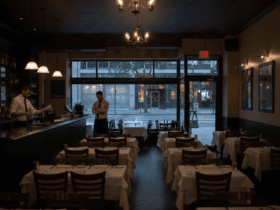In the bustling world of the culinary arts, managing a Multi-Location Restaurant Business stands as a monumental endeavor that demands astute leadership, strategic planning, and impeccable operational oversight. For restaurant owners, the complexity of ensuring consistent quality, service, and brand identity across various locales can be daunting, yet mastering these elements is crucial for sustainable growth and success. This blog delves into the intricacies of multi-location restaurant management, offering a comprehensive guide that encapsulates everything from drafting a robust business plan to implementing effective restaurant management strategies.
Designed for restaurant owners and managers, this guide serves as a beacon, illuminating the path to achieving operational excellence.
1. Understanding the Restaurant Business Landscape
Before embarking on the journey of managing a Multi-Location Restaurant Business, it’s vital to grasp the essence of what type of business a restaurant is. Restaurants operate in a dynamic environment where customer satisfaction, quality control, and operational efficiency intertwine to create a successful business model. Recognizing the unique challenges and opportunities within the restaurant industry is the first step towards crafting a tailored business plan that addresses the specific needs of a multi-location setup.
2. Crafting a Business Plan Template for Restaurants
Developing a business plan is the cornerstone of starting a Multi-Location Restaurant Business. A comprehensive business plan template for restaurants should encompass key components such as market analysis, competitive landscape, marketing strategies, financial projections, and operational plans. This blueprint not only guides the restaurant’s strategic direction but also serves as a critical tool for securing investments and navigating the complexities of scaling operations across multiple locations.
Must Read: How important is it to build a Social Media Community For Your Restaurant?
3. Operational Excellence in Restaurant Management
Effective restaurant management is the linchpin of a thriving Multi-Location Restaurant Business. From the back-end kitchen operations to front-of-house customer service, every aspect needs to be meticulously managed. Restaurant managers must excel in various domains including staff training, inventory control, quality assurance, customer relations, and financial management. Leveraging restaurant management tips and best practices can significantly enhance operational efficiency and ensure a consistent dining experience across all locations.
4. Implementing Restaurant Operations Management
The heartbeat of any restaurant lies in its operations. Restaurant operations management entails a holistic approach to overseeing the day-to-day activities, ensuring that each location functions like a well-oiled machine. Key areas such as menu planning, supply chain management, health and safety regulations, and customer service protocols are integral to maintaining operational continuity and brand consistency.
5. Utilizing Restaurant Management Services
For restaurant owners, navigating the complexities of multi-location management can be overwhelming. Employing restaurant management services can offer professional guidance and support in areas like HR management, financial planning, marketing strategies, and technology integration. These services can provide the expertise needed to manage restaurant operations effectively, allowing owners to focus on strategic growth and customer engagement.
6. The Art of Managing a Restaurant in a Multi-Location Restaurant Business
Managing a restaurant requires a blend of passion, dedication, and strategic thinking. It involves not only overseeing the daily operations but also understanding the nuances of the restaurant industry. From analyzing customer feedback to keeping abreast of market trends, effective management is about creating a dining experience that resonates with patrons and sets the establishment apart in a competitive market.
7. Defining Restaurant Management and Operations
To manage a restaurant successfully, especially across multiple locations, it’s essential to have a clear definition of restaurant management and operations. This involves establishing standardized processes, setting performance benchmarks, and implementing management systems that align with the business’s goals. Understanding the intricacies of restaurant operations and management provides a framework for achieving operational excellence and sustaining business growth.
8. Restaurant Management Tips and Techniques
Navigating the Multi-Location Restaurant Business landscape requires a set of refined management tips and techniques. Key strategies include developing a strong brand identity, implementing efficient cost-control measures, fostering a positive workplace culture, and leveraging technology to streamline operations. These techniques not only improve the overall efficiency of the business but also enhance the customer dining experience.
9. The Future of Restaurant Operations and Management
As the restaurant industry evolves, so too must the approach to restaurant operations and management. Staying ahead of industry trends, embracing technological advancements, and continually refining management practices are essential for staying competitive in the ever-changing Multi-Location Restaurant Business. The future of restaurant management will likely see a greater emphasis on sustainability, digital integration, and personalized customer experiences.
Must Read: The Definitive Guide To Creating A Restaurant Business Plan
Conclusion: Mastering the Art of Multi-Location Restaurant Management
Managing a Multi-Location Restaurant Business is an intricate dance of strategic planning, operational efficiency, and continuous improvement. By embracing a comprehensive approach to restaurant management, owners and managers can navigate the complexities of the industry, drive sustainable growth, and create unforgettable dining experiences for customers. As we explore the vast landscape of restaurant management, it becomes clear that the key to success lies in the meticulous attention to detail, a deep understanding of the business, and a relentless pursuit of excellence.









Leave a Reply